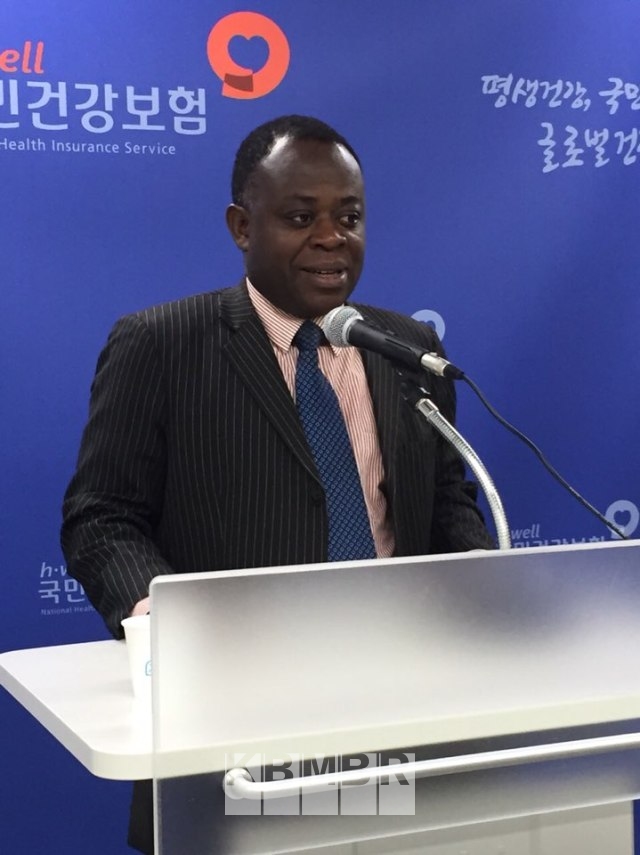National Health Insurance Service Has Run an International Training Program on Health Insurance for Over a Decade: Expands ODA Project
A pilot project based on South Korea’s national health insurance system and management know-how will aim to expand the health insurance system to more local subscribers in Ghana’s Volta Region. If the subscription rate of local residents increases from the current 38% to 60%, the insurance system will be expanded and operated throughout the entire nation.

Honggyun Lee, head of the National Health Insurance Service’s Policy Institute met with reporters covering the agency on April 19 and said, “ We have passed on our experience and know-how in operating the national health insurance system while running a training program as part of a cooperative project on health insurance with Ghana since 2013. And as the fruit of such efforts, we will launch a pilot project to give access to more local subscribers."
For this, the National Health Insurance Service (NHIS) and Ghana's National Health Insurance Authority (NHIA) have conducted a joint study as the basic research for the pilot project since 2014 and Korean experts including those from NHIS visited Ghana and discussed ways to expand the insurance policy to more subscribers.
Lee Hong-gyun explained, "The ODA project of the National Health Insurance Service is a process of debating and consulting to design a health insurance policy customized to the different circumstances that each country is in. The Ministry of Health and Welfare organized the project and the Korea Foundation for International Healthcare (KOFIH), the Health Insurance Review and Assessment Service, and the academia are collaborating for the success of the project."
He said, "There are still many countries that do not have a health insurance system as good as ours. The health insurance policy in Mexico, where I recently visited, made me feel like I was witnessing South Korea in the 1970s. A total of eleven countries, starting with Mexico, Colombia, Peru, India, and Iran have visited South Korea to sign MOUs or to study our policy. Our health insurance is expanding its role as a global leader."
In fact, over 250 health and medical experts from thirty countries annually visit South Korea and the NHIS as part of the Health Insurance International Training Program, which the service has hosted every year since 2004.
In particular, Ghanaian government officials are taking part in the latest training program, which will be held from April 18 to 22, ahead of their pilot project, so the course focuses on information that Ghana needs, such as the management experience in the early days of introducing the system, the ICT system, analysis of health insurance statistics, big data analysis, etc.

Francis Asenso-Boadi, director of research and development at Ghana's National Health Insurance Authority said, "In 2013 when we signed an MOU with KOFIC, the health insurance subscription rate in Ghana was at a standstill at 38% and we were studying ways to make improvements by ourselves. With South Korea, we jointly conducted surveys to increase the subscription rate and came up with two alternatives. We decided to launch a pilot project in three of the seventeen districts in Volta. The project will be carried out for a total of nine months beginning in June and we plan to expand it nationwide after an evaluation of the project's performance.
Asenso-Boadi added, "Now, it is mainly the sick person in the family who subscribes to the national health insurance, but if we encourage them to subscribe as a family, we will be able to attract more local subscribers. At the same time, if we promote our national health insurance system to the public more aggressively, we expect to reach a subscription rate of 60%. In the long term, we hope to establish a single health insurance system."
In particular, Asenso-
Boadi explained that South Korea's ODA was a good role model, for it mainly provided consulting services that took into consideration the unique situation of Ghana compared to other advanced countries.
"Other advanced countries simply advised us to learn from successful cases without hearing us out. We liked how South Korea pondered over the issue from the designing stage. We still have to consider the fact that South Korea's fee-for-service system can increase the burden of medical fees, but it would be nice for all citizens to have resident registration cards as they do in Korea,” he said.
Asenso-Boadi shared his expectations saying, "Our countries' doctors welcome more subscribers to the national health insurance. If the number of patients receiving benefits increases, the cost that the scheme pays will also increase, allowing this to become one way for the government to provide support."
In this regard, the NHIS plans to expand its ODA project with other countries such as Ethiopia.
In October, the NHIS will discuss trilateral cooperation with Ghana and Ethiopia in Ethiopia to maximize support in the Africa region.
In addition, the service also plans to establish cooperation with international organizations like the World Bank and WHO as well as with KOFIH and work to hold a forum on universal health care (UHC) for the people in Africa and seek ways to provide support.
Lee said, "Promoting our health insurance policy throughout the world will raise the status of our country and also boost our pride. We can get rid of diseases in other countries by introducing our system. We will provide customized support that can actually help developing nations and fulfill our role as a leader in health insurance."

